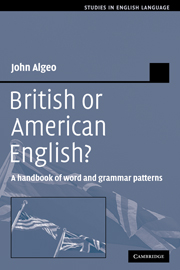Book contents
- Frontmatter
- Contents
- Preface
- Acknowledgments
- Introduction
- Part I Parts of Speech
- 1 Verbs
- 2 Determiners
- 3 Nouns
- 4 Pronouns
- 5 Adjectives
- 6 Adverbs
- 7 Qualifiers
- 8 Prepositions
- 9 Conjunctions
- 10 Interjections
- Part II Syntactic Constructions
- Bibliography of British book citation sources
- Bibliography of studies, dictionaries, and corpora
- Index of words
- Frontmatter
- Contents
- Preface
- Acknowledgments
- Introduction
- Part I Parts of Speech
- 1 Verbs
- 2 Determiners
- 3 Nouns
- 4 Pronouns
- 5 Adjectives
- 6 Adverbs
- 7 Qualifiers
- 8 Prepositions
- 9 Conjunctions
- 10 Interjections
- Part II Syntactic Constructions
- Bibliography of British book citation sources
- Bibliography of studies, dictionaries, and corpora
- Index of words
Summary
Interjections, whether single-word or multiword forms, are numerous and are particularly apt to vary between national varieties. The class of interjections is close to open-ended. The following list is therefore of examples only. Some of the items occur also in American use, and some are old-fashioned in use but nevertheless seem characteristic of British English.
Characteristically American interjections include uh huh (CIC 3478.4 iptmw in American texts versus 30.9 in British texts) and wow (CIC 282.8 iptmw American versus 78.9 British). For huh, see eh below. For hi and howdy, see hello below. The form OK or okay, which has been called America's most successful export to the world, has approximately equal use in British and American English; CIC has 2720 iptmw in British texts versus 2710.1 in American texts.
aargh, aaargh CIC has 25.3 iptmw in British texts versus 0.2 in American texts. <‘I think we're doing the drawing room tomo – AARGH!’ [¶] With two loud cracks, Fred and George … had materialized out of thin air in the middle of the room.> 2003 Rowling 66.
ah This interjection has been reported as nearly 4 times more frequent in British conversation than in American (LGSWE 1097). CIC has 1247 iptmw in British texts versus 262.8 in American texts.
aha This interjection has been reported as more than 4 times as frequent in British conversation as in American (LGSWE 1097). CIC has 247.3 iptmw in British texts versus 6.8 in American texts. Cf. also ha and ooh below.
aye Used as a response in discourse, aye is a distinctively British form seldom used in American (LGSWE 1098). CIC has 606.9 iptmw in British texts versus 21.4 in American texts, many of them parliamentary language.
[…]
- Type
- Chapter
- Information
- British or American English?A Handbook of Word and Grammar Patterns, pp. 207 - 214Publisher: Cambridge University PressPrint publication year: 2006

